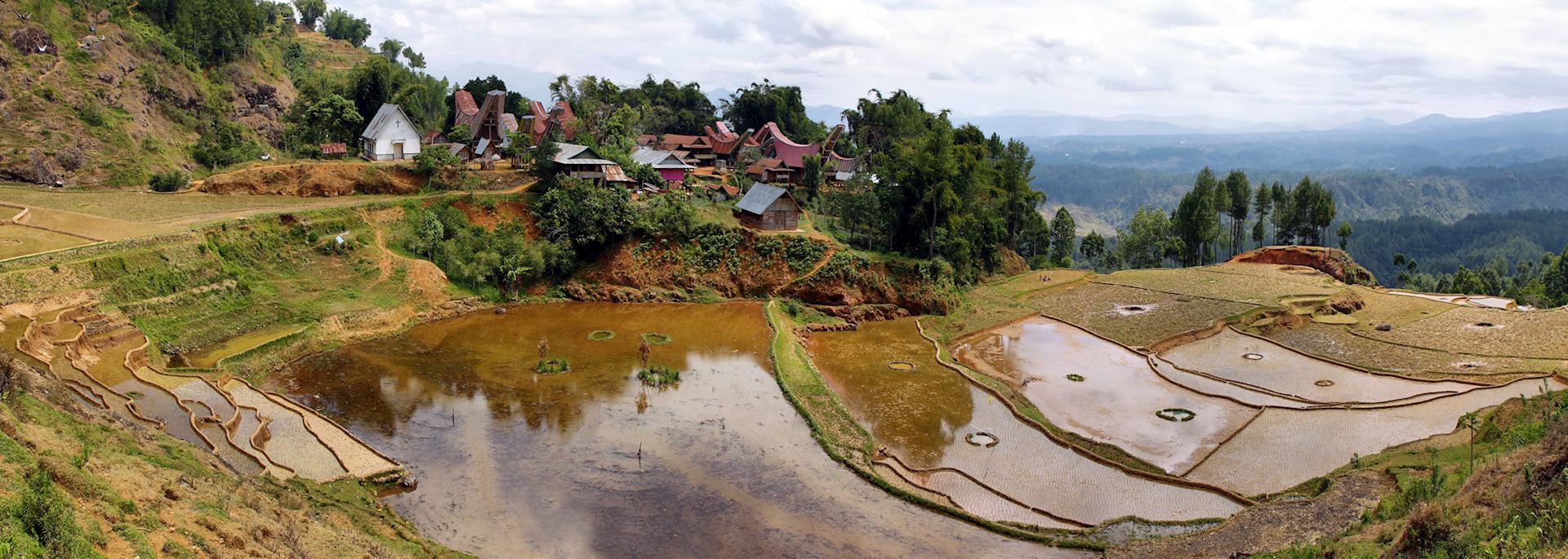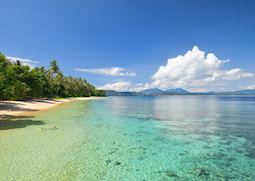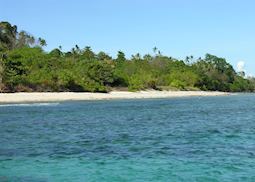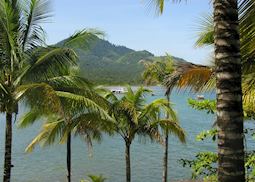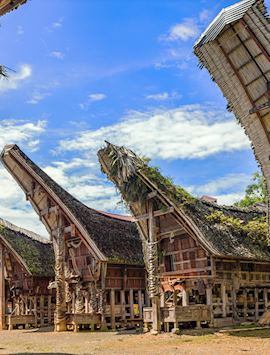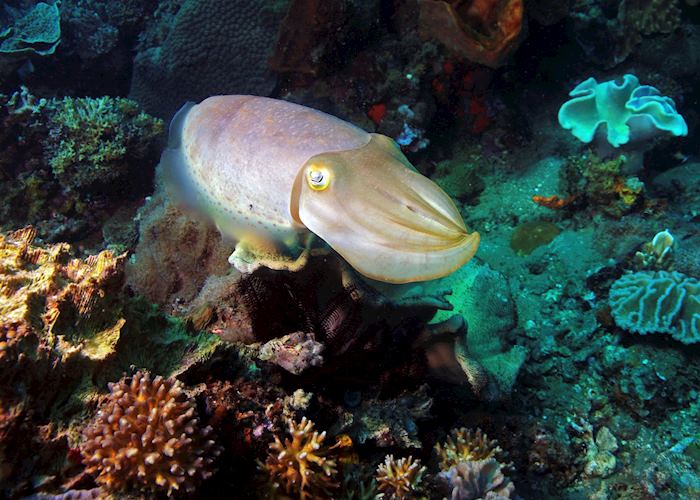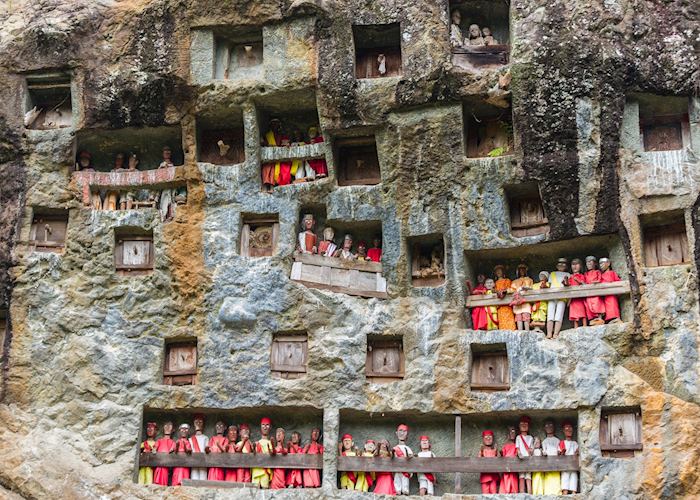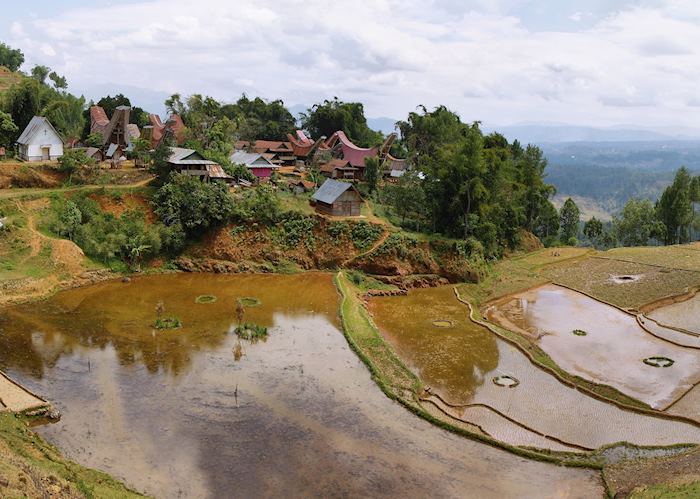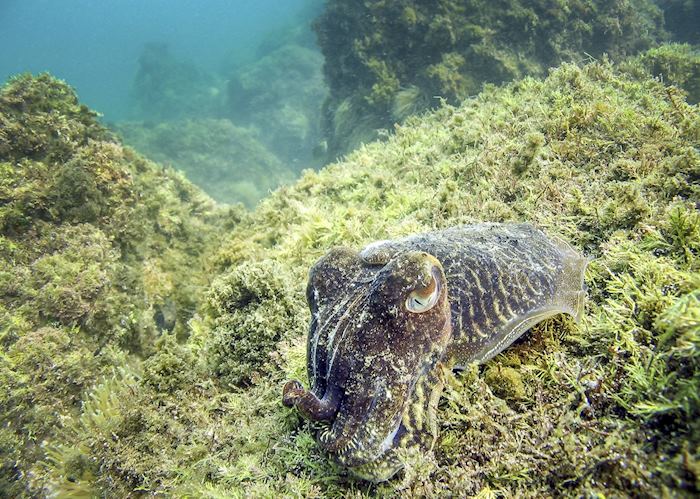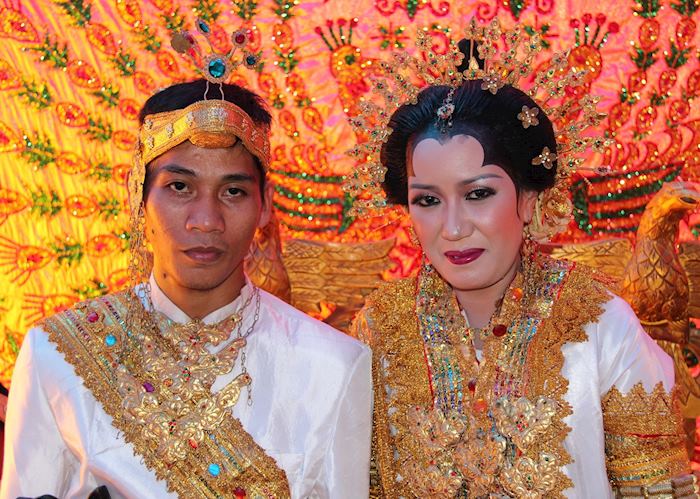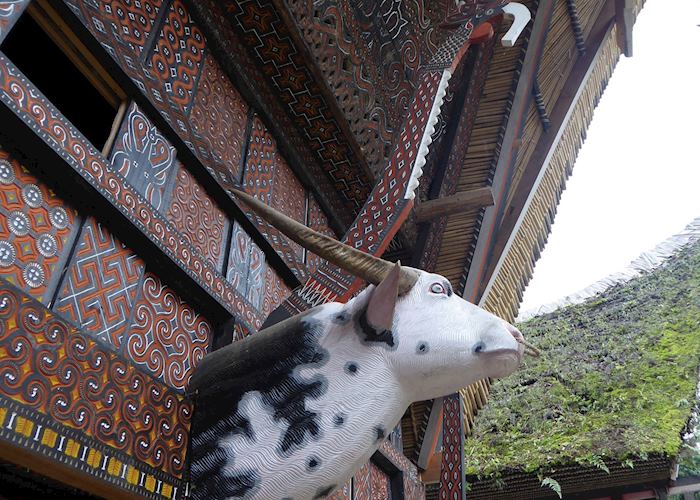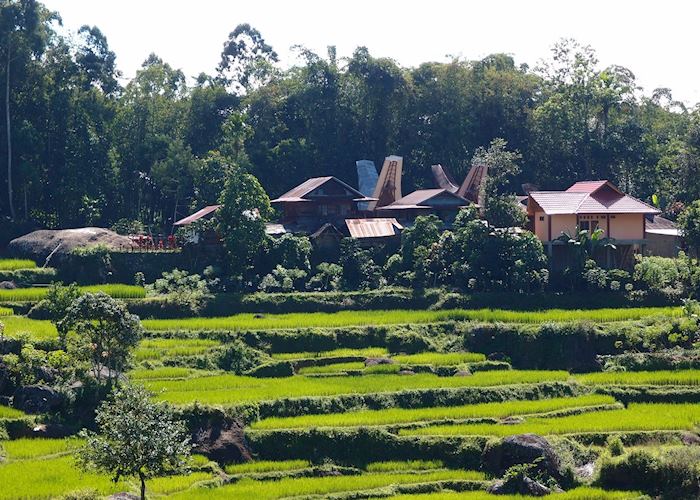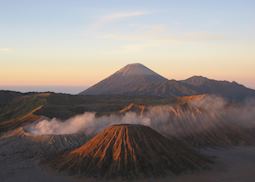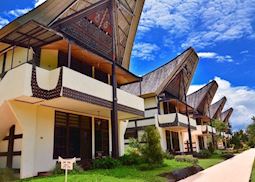Jump to:
When 16th-century Dutch explorers tried to map Sulawesi, they were so confused by its jumble of mountains and sprawling peninsulas that they deemed it an archipelago. While it is in fact one of Indonesia’s largest islands, you can see where the Dutch were coming from. Due to the extreme topography of the island, sections have developed in relative isolation, giving the endemic wildlife sanctuaries to thrive in and people space to develop customs and beliefs you won’t find anywhere else.
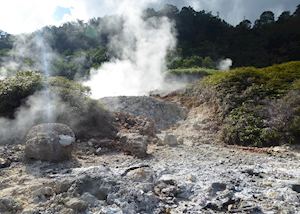 The island can be reached from a number of cities in Indonesia, flying into Makassar in the south and Manado to the north. Manado is the biggest city on the island and home to most of the population. Although it’s generally a transport hub for onward travel, it’s worth lingering to see the well-preserved Fort Rotterdam, a remnant of Dutch rule, which houses a museum of Sulawesi culture. Predominantly a fishing-village-turned-city, in the early morning you can tour the marina to see lines of pinisis (Indonesian sailing ships), their catch being transported to the nearby fish market.
The island can be reached from a number of cities in Indonesia, flying into Makassar in the south and Manado to the north. Manado is the biggest city on the island and home to most of the population. Although it’s generally a transport hub for onward travel, it’s worth lingering to see the well-preserved Fort Rotterdam, a remnant of Dutch rule, which houses a museum of Sulawesi culture. Predominantly a fishing-village-turned-city, in the early morning you can tour the marina to see lines of pinisis (Indonesian sailing ships), their catch being transported to the nearby fish market.
Makassar is mostly Muslim, and tours can be arranged with the imam of a local mosque if you’d like to learn more. Large chunks of the south are predominantly Christian — stop in the village of Sengkang and you’ll see a Jesus statue taller than Rio’s Christ the Redeemer — but head to the Tojora region and you’ll find a people who practise Christianity alongside animalistic beliefs.
The Torajans believe that without a proper funeral, the deceased’s spirit could bring misfortune to the family. Subsequently, elaborate funeral ceremonies are an important part of village life, lasting for days with traditional rituals and feasting. Stay in the area and you’ll be welcomed to attend one — foreign guests are seen to elevate the importance of the deceased.
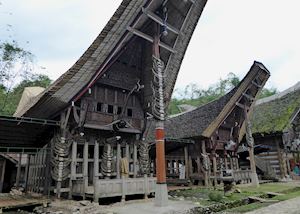 If your visit doesn’t coincide with a ceremony, you can still admire the architecture of the villages. The skyline is punctuated by lines of Tongkonans, wooden houses with oversized roofs that look like giant saddles. These ancestral homes are paired with alang, intricately carved rice barns on stilts that perch over green paddies and chicken runs. Cliff and cave cemeteries are scattered through the region where the entombed are watched over by tau taus (life-sized wooden effigies of the dead).
If your visit doesn’t coincide with a ceremony, you can still admire the architecture of the villages. The skyline is punctuated by lines of Tongkonans, wooden houses with oversized roofs that look like giant saddles. These ancestral homes are paired with alang, intricately carved rice barns on stilts that perch over green paddies and chicken runs. Cliff and cave cemeteries are scattered through the region where the entombed are watched over by tau taus (life-sized wooden effigies of the dead).
North of Toraja are the relatively impenetrable mountains of central Sulawesi, which we suggest eschewing (by a short domestic flight) for the northernmost peninsula.
Here you’ll find Tomohon, a landscape that’s pitted with fumaroles and hot springs that fill the air with steam against a backdrop of volcanic calderas. Here you can trek up a defunct lava flow to the crater of Mount Lokon or take a boat across Lake Linow, whose mineral-rich water changes shade depending on the amount of sunlight each day.
A few hours’ drive from Tomohon is Tangkoko National Park, a reserve of coastal mangroves, deciduous forests and high, mountainside scrubland. Birdwatchers can see the endemic red-knobbed hornbill, the pit digging maleo bird and the rare celebes crested macaque, but the real draw of the park is the chance to see the doe-eyed tarsier. Take a guided evening walk and you might spot this tiny nocturnal primate peering back at you, as well as bats and, if you’re extremely lucky, the rare Sulawesi dwarf cuscus.
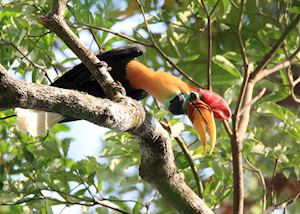 Sulawesi sits right atop the coral triangle, widely considered the richest marine environment in the world. Some of the best spots are around the jungle-topped headlands of the northern peninsula. Around the islands of Bunaken Marine Park snorkellers and divers can see reef sharks, eagle rays and turtles against a backdrop of flourishing coral.
Sulawesi sits right atop the coral triangle, widely considered the richest marine environment in the world. Some of the best spots are around the jungle-topped headlands of the northern peninsula. Around the islands of Bunaken Marine Park snorkellers and divers can see reef sharks, eagle rays and turtles against a backdrop of flourishing coral.
Just around the coastline, world-class divers travel to the Lembeh Strait to muck dive (the search for tiny critters on the sea floor). Along the volcanic-sand floor you might spot a tiny but highly venomous blue-ring octopus, kaleidoscopic shrimp or pygmy seahorses.
Best time to visit Sulawesi
Temperatures are relatively consistent, hovering between a comfortably warm 20 to 35°C (68 to 95°F). Dry season normally falls between April and October and while we consider Sulawesi a year-round destination, the wettest months tend to be January and February.
who's been there
-
01993 838 92501993 838 110
- Make an enquiry
Places to visit in Sulawesi
Featuring heavily on our experiences of visiting Sulawesi, these selected places are destinations that also prove consistently popular with our travellers. Our specialists can help you choose how to include them in your wider trip, based on your preferences.
Suggested itinerary featuring Sulawesi
This sample itinerary will give you an idea of what is possible when you travel in Sulawesi, and showcases routes we know work particularly well. Treat this as inspiration, because your trip will be created uniquely by one of our specialists.
Places in and around Sulawesi
- Bunaken National Marine Park Sulawesi
- Gangga Island Sulawesi
- Manado Sulawesi
- Rantepao Sulawesi
Photos of Sulawesi
Our expert guides to exploring Sulawesi
Written by our specialists from their own experiences of visiting Sulawesi, these guides will help you make the most of your time there. We share both our practical recommendations and the best ways to appreciate Sulawesi at its best.
-
Sulawesi: Indonesia for the adventurous ![Cuttlefish, Sulawesi]()
Sulawesi: Indonesia for the adventurous
Sulawesi: Indonesia for the adventurous
An overlooked island that’s far bigger than Bali and arguably more untouched than Borneo, Sulawesi is a destination for intrepid, worldly explorers. As a visitor, you’ll have the rare chance to see the complex beliefs of the Torajan people, explore volcanic scenery and discover world-class diving.
Read this guide -
What to do in Indonesia: our highlights guide ![Sunrise over Mount Bromo, Indonesia]()
What to do in Indonesia: our highlights guide
What to do in Indonesia: our highlights guide
Active volcanoes, exotic wildlife and outstanding beaches; the Indonesian archipelago has so much to offer. Spend time with the Taroja people and discover their traditions or explore the many Buddhist temples.
Read this guide
Accommodation choices for Sulawesi
We've selected a range of accommodation options for when you visit Sulawesi. Our choices usually come recommended for their character, facilities and service or location. Our specialists always aim to suggest properties that match your preferences.
-
![Cottage Suite, Toraja Misiliana Hotel]()
Toraja Misiliana
Sulawesi

